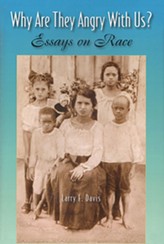America is taking a hard look at race relations. The Black Lives Matter movement, founded in response to the Florida shooting death of Trayvon Martin and subsequent acquittal of his assailant, George Zimmerman, has expanded to address incidents from Ferguson, Mo., to Baltimore, Chicago, New York City and beyond. These deaths, all involving unarmed black Americans, are forcing the country to confront racial issues that many find difficult to discuss.
In his new book, Why Are They Angry With Us?: Essays on Race (Lyceum Books, $34.95), Larry E. Davis seeks to help us talk more openly about race. Davis, the dean and founding director of the University of Pittsburgh’s Center of Race and Social Problems, hails from Saginaw, Mich. He was the first African American to earn a dual Ph.D. in psychology and social work from the University of Michigan, and the first African American to be awarded tenure at Washington University, in St. Louis. Before entering academia, he spent three years with the AmeriCorps VISTA program, working to fight poverty in one of New York City’s poorest neighborhoods.
Since arriving in Pittsburgh, in 2001, Davis has become a nationally recognized scholar on race relations and social justice. In 2013, he was inducted into the American Academy of Social Work and Social Welfare, a society for distinguished scholars and practitioners in those fields. Davis has also presented his studies to area leaders, including a 2015 report given to Pittsburgh Mayor Bill Peduto and Allegheny County Executive Rich Fitzgerald that detailed the region’s racial disparities.
As a professor who has taught courses on race for decades, Davis realizes that many people “shy away from the topic of race.” So he uses an approachable writing style that avoids jargon, and his book includes many personal anecdotes.
“It is an easy read because I wanted people to read it,” says Davis. “It is great to be profound, but in the end you want to reach an audience.”
Davis says issues surrounding race have occupied him for as long as he can remember, and even earlier. The book’s first personal anecdote, which Davis was too young to recall, recounts a 1960s train ride that he, his mother and his siblings took from their home in Michigan to his grandmother’s home, in Alabama. Due to her fair skin, his mother, who was black, was asked to join the whites-only car, but she refused and demanded to stay with her children. Davis writes that stories like these are “very much a part of the history of race in America.”
Another one of Davis’ early thoughts on race drove his research and provided the title of his book: “If we were slaves, why are they (whites) angry with us?” he writes. Readers might scratch their heads for an answer, but Davis elaborates and gives more context to this simple, but stumping question:
Davis’ other thought-provoking questions include, “Why can’t black people claim Irish roots too?” (Davis writes how his grandfather was of Irish descent — making Davis himself just as Irish as, if not more so than, many of his white colleagues who celebrate St. Patrick’s Day.) Other topics include social media’s effects on racial equality, the erasure of black American’s ancestral history, and the problems with comparing black Americans to immigrants.
Davis says the book is not meant to focus too strongly on any particular issue, but he hopes his topics will help initiate discussions on the intricacies of race. “It has been my raison d’être, all of my life, I can think of nothing that I have thought of more.”















